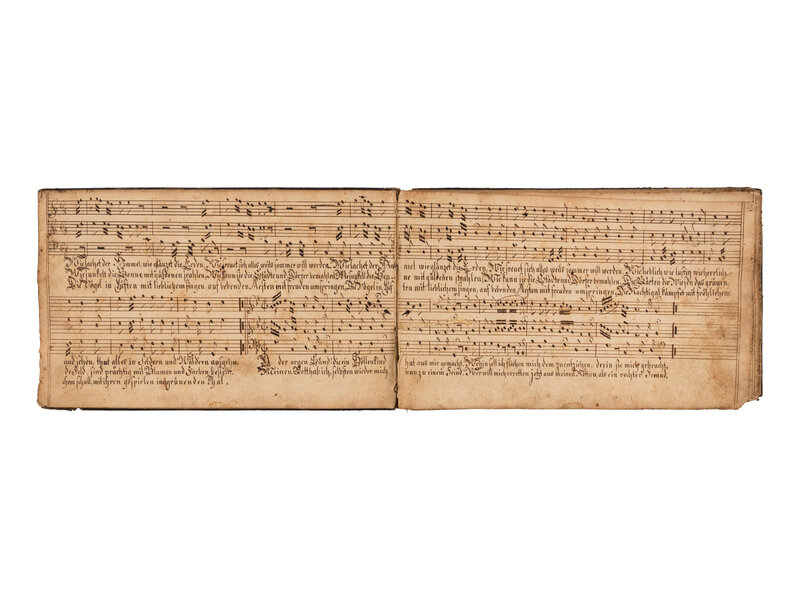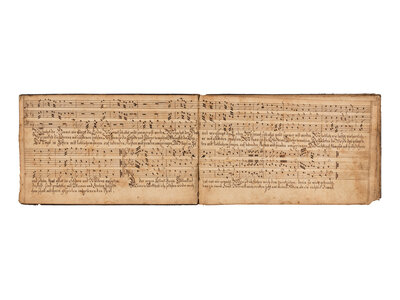Condition Report
Contact Information
Lot 67
GERMAN PROTESTANT SONGBOOK
Music Book of Hymns, belonging to Wilhelm Honinghaus, in German, manuscript on paper [Germany, 18th century]
Music Book of Hymns, belonging to Wilhelm Honinghaus, in German, manuscript on paper [Germany, 18th century]
Sale 2033 - Western Manuscripts and Miniatures
Jun 27, 2024
10:00AM CT
Live / Chicago
Own a similar item?
Estimate
$1,500 -
2,000
Price Realized
$2,032
Sold prices are inclusive of Buyer’s Premium
Lot Description
GERMAN PROTESTANT SONGBOOK
Music Book of Hymns, belonging to Wilhelm Honinghaus, in German, manuscript on paper [Germany, 18th century]
Music Book of Hymns, belonging to Wilhelm Honinghaus, in German, manuscript on paper [Germany, 18th century]
The early history of collecting manuscripts in America has yet to be fully written, and this book, a Protestant hymnal brought from Germany by an immigrant, tells part of that story.
145 x 238 mm. 35 leaves of paper + v (paper), eighteenth-century pagination in top outer corner of rectos and versos, 1-67, omitting 68, complete (collation: i2, ii-ix8, x2), ruled in brown ink for seven staves of five-lines (written space: 145 x 227 mm), written on six lines in brown ink in an eighteenth-century German fraktur (spots, stains, browning, and small marks, loose sewing of the quires, last quire of flyleaves detached). Bound in a contemporary brown soft leather binding (scuffs at corners and spine, scratches, else in good condition).
This manuscript was the personal music book of Wilhelm Humrighaus, who inscribed it with his name. More than 30 songs, mostly hymns, are calligraphically written in a beautiful German fraktur script across each double opening, giving three vocal parts for singing. The flyleaves contain a number of nineteenth-century American additions in English
The songs that we have identified are hymns that circulated during the Reformation. For example, the first hymn, “Wie lachet der Himmel, wie glauzet der erden” (How the heavens laugh, how the earth shines) was composed by Johan Caspar Bachofen (1695-1755) a Swiss music teacher and hymn composer, singing master at a Latin school, and cantor at Grössmunster Protestant Church in Zurich. Other hymns are by Benjamin Schmolk (1672-1737) and Johannes Thomas Rüegg: “Seele wilst du dich noch Krancken” (Soul, do you still want to offer yourself). Schmolk, the son of a Polish Lutheran pastor, wrote a total of 900 hymns and was influenced by the Pietistic movement of the Reformation, which reacted to the perceived lack of spirituality on the part of Luther and his followers. Other hymns remain to be identified, making the manuscript a rich resource for further research.
Newly composed hymns played an important role in the Protestant Reformation; Luther himself composed many hymns, convinced that hymns should be written in everyday language for everyone to sing, bringing the words back to the people. Protestant composers continued to write new hymns and revive older ones through the next three centuries. It is even said that song is what helped the Reformation spread so fast and so far. Either William, the owner of the present manuscript, or his descendant Mary brought the book to Ohio in America when they immigrated in the nineteenth century
Provenance
(1) A near-contemporary German ownership inscription records that this was once the book of Wilhelm Humrighaus. In the nineteenth century, the first part of his name was anglicized as William.
(2) Further inscriptions record its ownership by an apparent descendent, Mary Homrighaus (as well as under her married name: Mary Beck), of Lithopols, of Fairfield County, Ohio (dated 9 April and 25 March 1869). It is worth noting that the first permanent settler in Ohio is recorded as establishing a home there in 1788. At the turn of the nineteenth century, a Homrighaus who was most probably Mary’s grandfather was remembered by one Daniel Crumly as among his childhood neighbors in nearby Bloom township (see Scott 1877, p. 217). He may have been the William who once owned this book, which was perhaps brought when he emigrated to America in the very last years of the eighteenth century. If so, this manuscript may be among the very first European objects to have arrived in Ohio and may well be the first recorded manuscript from that state.
(3) Private collection, USA.
LITERATURE
Further literature, see H. Scott, Complete History of Fairfield County, Ohio, 1877; Frances E. Cox, tr., Sacred Hymns from the German, London, 1841.
Freeman’s | Hindman thank Senior Consultant Sandra Hindman and Elliott Adam for their assistance in preparing this sale.

